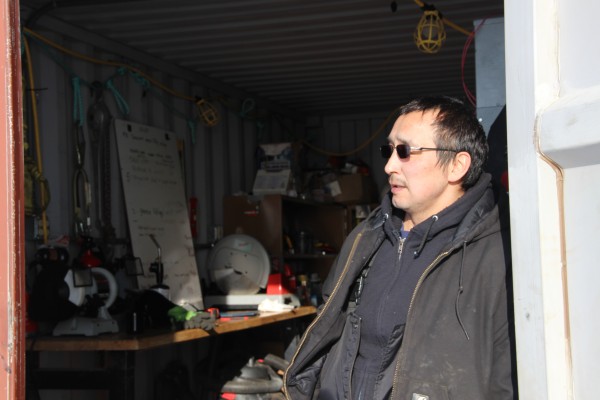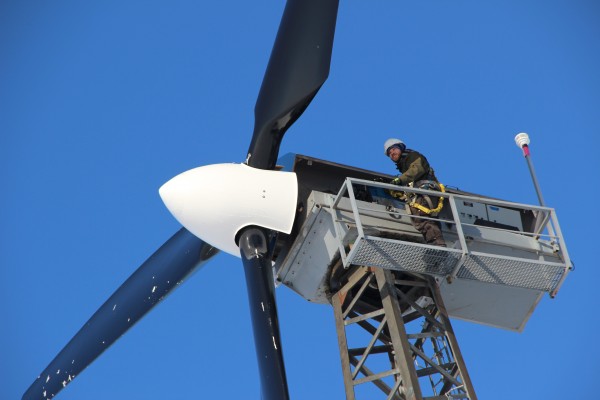
When it comes to energy innovation in rural Alaska, technology is only half the story. The real necessity is people power.
In Kwigillingok, the sun is shining, and the reflection off the tundra is almost too bright to bear. Of the village’s five wind turbines, just one is turning. But 12 hours ago, these turbines took a serious beating. A major blizzard came through, with gusts up to 60 miles per hour.
So Benny Daniel is getting ready to climb up and check the blades.
Daniel is the lead wind tech in Kwigillingok. He’s been doing this work for about five years. And in the beginning, he wasn’t so sure about the 80-foot towers.
“At first, when I climbed, I was like, what did I get myself into?” Daniel said with a laugh. But now, the turbines are his territory.
“Especially when it’s warm, calm day,” he said. “When the sun is out and it’s warm, I like it up there.”

He’s up there in all kinds of weather, checking the brakes and fluids, and making sure there are no cracks or leaks.
And while Kwigillingok’s wind system is technically exciting — combining wind turbines, batteries and electric thermal stoves with diesel generators — what’s maybe more exciting are skilled people like Daniel, who maintain and operate the system with limited need for outside help.
That’s the key to a sustainable system in Alaska’s remote villages, said William Igkurak, the Chaninik Wind Group’s president.
“We were always told that we have no resources,” Igkurak said. “By that, they probably meant we didn’t have the human capacity. That we didn’t have trained people.”
For years, Igkurak watched contractors come into town, build something, take their payment and go — and the village was stuck trying to maintain whatever they left behind.
When something broke, Kwigillingok had to call someone in – perhaps from the Lower 48. Weather would delay parts, equipment and mechanics. It was expensive.
This time, Igkurak decided, his people would help build the system so they could maintain it.
“That would be a plus that would make someone’s life a whole lot better,” he said. “They would know that they would be able to compete in the world market.”
And with four villages working together, if Kwigillingok needs help, they can call in someone from Kongiganak. When something breaks, there might be a spare part in Tuntutuliak.
Roderick Phillip, of Kongiganak, is Chaninik’s vice president. He points out that most of the people working on the system speak Yup’ik as their first language, so it helps to have multiple people going through training, translating concepts for each other. Now, he said, many of the turbine parts have Yup’ik names.
And, Phillip said, it’s a natural fit in a region where people are already self-sufficient by necessity.
“We fix everything,” he said. “We have to keep everything going in our homes, our snow machines, our four wheelers, our outboards. We have to fix our own boilers and computers, install our own satellite dishes … I think that’s one of the reasons why our people have been successful in operating and maintaining our systems.”

Back at the turbine, Mike Wassallie is getting ready to climb with Benny Daniel.
“How is it up there?” I asked.
“It’s fun, I like it,” he answered. “You can see the ocean from up there.”
Wassallie is 27, and originally from Kongiganak. He used to work as a clerk at the local store there.
“This is way better,” he laughed.
That’s what Igkurak likes to hear.
“That would be something,” he said. “That would be something that would make me feel happy – that our group has done something to prove that our people, once given the chance and the resources, they are able to compete.”
“I know what our people can do once you give them a chance. They will be able to do something and make a difference.”
